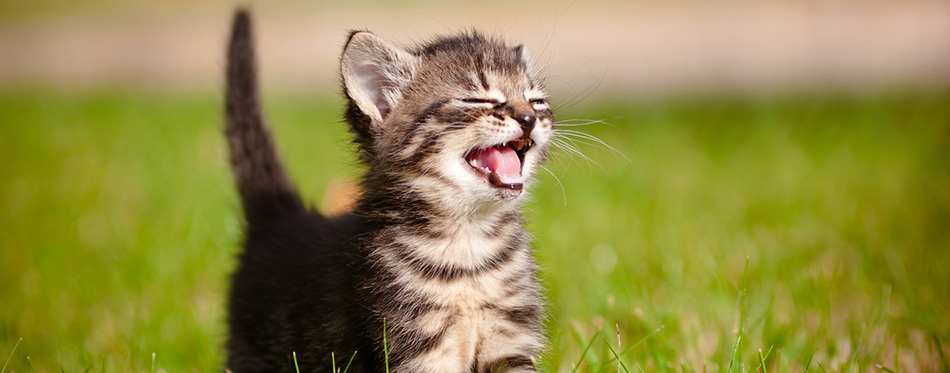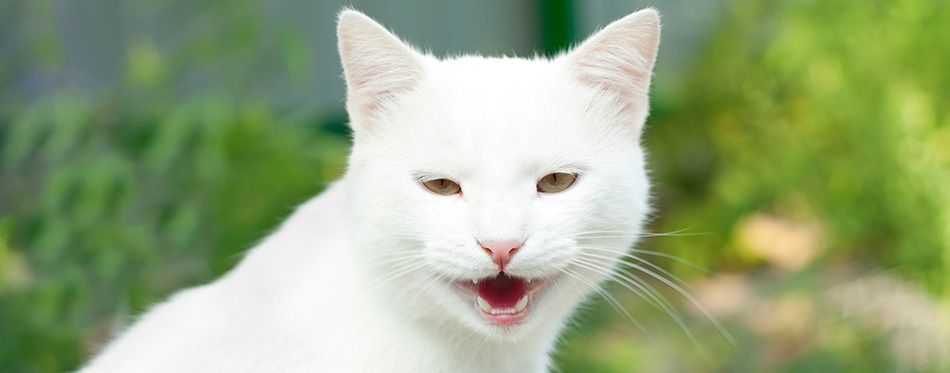You already know that your cat can be a complex animal, with a host of feline behaviors to understand. But taking the time to understand your pet will make your life together all the sweeter. All cats are vocal and have a host of sounds to tell you exactly what they want as well as what is wrong. And their caterwaul has been designed to be the one that makes you stand up and take notice.
Distinct, direct and, at times, unnerving, the caterwaul is the one you need to be aware of and try to understand as your cat is wanting you – or other cats – to respond. We take a look at the caterwaul and try to decipher just what your cat is trying to tell you.

What is Caterwauling?
A cat’s caterwaul is a feline noise like no other. Unlike the cute meow or the contented purr, the shrill wail of a caterwaul can sound like your precious pet is in pain. A mix between a whine and an all-out yowl is the basic caterwauling definition – and it is a cat sound that demands attention. Your cat has a host of sounds and ‘voices’ at its disposal and caterwauling is its most melodramatic. And this is a cat call that’s not gender specific – although it is a sound most commonly emitted by pets that have not been spayed or neutered.
Why do Cats Caterwaul?
To totally pin-point the caterwaul to hormones is to do your kit a disservice as there are other things their caterwauling may be trying to tell you. Here are six of the most common reasons why your cat may resort to the caterwaul.
- It could be a signal your cat is ready to breed
Cats that have not been spayed or neutered are known to be serial caterwaulers as it’s how they let other felines know when they are ready to mate. When a female is in heat, she will proclaim the fact across the neighborhood with a loud caterwauling cry. A male will respond to let the world know he can smell a female in heat. Not only is all this noise maddening for you, but also those who live around you. To curb the caterwauling – and to keep good neighborly relations – as well as to prevent unplanned kittens, then spaying or neutering your pet is the solution.
- They are in pain or feeling unwell
Cats are stoical creatures but sometimes when they are in pain or feeling poorly, they have no choice but to caterwaul. If your otherwise calm and happy cat starts to caterwaul for no reason, then pain or sickness could be the cause.
An injured cat will tell you that all is not well, but other, less visible traumas or painful medical conditions can also cause them to protest rather loudly. There are also some diseases that are known to cause a cat to vocalize excessively, including an overactive thyroid and kidney problems. If your furball suddenly starts to caterwaul and there are no visible signs of injury and they have been neutered, then a check-up visit to the vet is a good idea.
- It’s an alert signal
We all know our cats love to sit in the window to watch the world go by, but this can also be a trigger for an unexpected caterwaul. Cats are territorial and so that sudden shrill cry can be an alert that something is up outside and there is unwanted action on their ‘turf’. If your feline feels their space has been invaded or they can see another cat or animal intruding on their patch, then their wailing alarm siren could well be tripped. To soothe an agitated puss, close the curtains or blinds, or let them outside on a cat leash to be reassured it is still their patch.
- They are feeling vulnerable, insecure or stressed
Stress can get us all a bit wired and your cat is no exception. When your feline is anxious or feels insecure and vulnerable, he will make his feelings known. Being left alone, abandoned for long periods of time or finding himself in unfamiliar surroundings are all triggers for a caterwaul response, and this is a sign of real distress.
When he caterwauls for these reasons, he is letting you know he is scared or distressed and wants to feel safe. If you suspect anxiety is causing your cat to get vocal, take steps to reassure and calm him, be available, give lots of cuddles and support him to slowly adjust to any change so that they once again feel safe and content in their home space.
- They want your attention
When all other options have been exhausted and your cat is in need of some essential care, he will resort to the caterwaul to get the ‘take notice of me’ message home.
Whether it is food, water or physical attention, he wants his basic needs met and will demand loudly if you are falling short. However, the risk here is that he can learn to use the caterwaul to also manipulate, for treats for example, and you need to know the difference. Rewarding negative behavior will make it more likely, rather than stop it its tracks so resist the temptation to feed a treat every time he shrieks. Instead, ensure his daily needs are being met and spend quality time with him so you are more tuned into the real reasons behind his attention-grabbing caterwaul.
You may also like our article on the Best Cat Treats.
- Feline cognitive dysfunction
As your cat ages, you may well see changes in their level of attention and cognitive skills. Similar to human dementia, feline cognitive dysfunction (FDC), affects more than 50% of cats over 15 years old to some degree and excessive vocalization is just one symptom. With a slowing of his mental capacity, the aged cat can become disorientated and confused, resulting in bouts of caterwauling, even in the safe and familiar confines of their own home. If you suspect this is the case with your older cat, he needs love and reassurance as well as a trip to the vet to be more thoroughly checked out.

What to do When Your Cat Caterwauls
The simple answer is to not ignore your cat when they start to caterwaul. This vocalization is not normal, everyday behavior and your pet is trying to highlight something about their health, their mental state or their environment.
If your cat gets loud and shrill in his communication, the key is to stop, listen and observe so you can try to identify the reason he feels the need to caterwaul. If it is a basic need he is missing, put it right, whether that’s refilling the empty water bowl, letting them out into the yard, or simply giving some attention or quality time. But if there is no obvious reason for your cat’s ruckus and he shows no sign in abating, then a trip to the vet to get him checked out is advised.
Source:
- The Cat’s Meow! Caterwauling in Cats – VCA Animal Hospital

